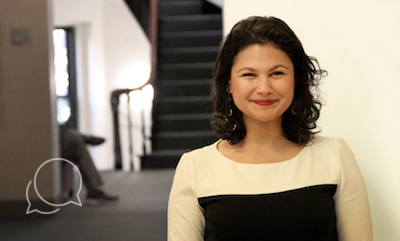‘Storytelling Has Amazing Equalizing Power’.

Pareesa Charmchi (’16) Part-Time Research Associate in the Boston Medical Center Department of Obstetrics and Gynecology; Research Assistant at SPH Center for Advancing Health Policy and Practice
Age: 26
Hometown: Atkinson, New Hampshire (“the town with the nation’s oldest co-ed school.”)
Breakfast: Sesame seed bagel with cream cheese (“It’s the only type of bagel that should exist”), and a large coffee
You are continuing to work on a project you entered for your practicum, evaluating a narrative medicine pilot program at Boston Medical Center. What is narrative medicine?
Narrative medicine is a relatively new field, and it comes from the idea that with people who have been trained to think in a very biomedical, positivist way, if you train them to study literature and to do close reading and reflective writing, then they can grow their empathy.
They can understand their patients’ histories as a part of the patients’ story as a full person. That will help them see not only symptoms, but what something means in a person’s day-to-day life, what’s most important to this person, how they’re affected, do they need to be connected to other services such as mental-behavioral services or support systems, or even what language they need to use to communicate with that person in order to heal as a team.
The idea is that the patient is a necessary player in their own healing.
The program also looks to improve the mental health of clinicians—how?
A lot of the clinicians (social workers, physicians, nurses) see patients who are survivors of sexual trauma or other types of trauma, and that can wear on a person. Even though you’re in a clinical mindset and you’re professional, you’re still probably going to be affected to some extent.
One of the goals of the pilot was to see if you can prevent burnout. There’s evidence in the literature that some clinicians will either leave the field (which tends to happen earlier, like in residency) or they might distance themselves to the point where they have trouble connecting with patients. If clinicians are having compassion-fatigue symptoms (fatigue, anxiety, trouble sleeping) then that’s a problem that we want to address and make sure clinicians are getting support.
Narrative medicine workshops are spaces where you can do that, because people are sharing their stories and saying, “I had trouble sleeping when I had this patient interaction,” and then someone else might say, “I had a very similar experience.” Just being in a room of people who you work with professionally and having those same kinds of vulnerable experiences together is in itself a relief.
Physician wellness for its own sake is important, but also physician wellness is going to impact patient care, I believe. When you take care of yourself, you’re going to take better care of your patients.
What has been most rewarding about your work with this pilot?
What’s really nice about program evaluation is that it’s a very pragmatic process where you can actually see through quantitative and qualitative data if what you are doing works. To be able to find out if a program helps people process the stories they’re being exposed to, and help them feel better prepared to respond to those patients and provide them appropriate care, that is so satisfying to me.
I also have a performance background, I studied classical music in undergrad and I used to do a lot of musical theatre and opera, and I think good storytelling has an amazing equalizing power. When you see someone tell a story or perform a song, or you read a narrative, you get to see an intricate slice of life. We have our professional selves, but we also have all of these driving factors and a personal history behind us, and art strips away some of that professional performance so you can see someone’s humanity.
How does this program fit in with your wider public health interests?
The issue of sexual violence and intimate partner violence was a big driver for Dr. Sheela Maru, the primary investigator, in wanting to do this pilot program, and that’s also an interest of mine that goes along with my sexual and reproductive health interest.
In undergrad I was involved in our feminist group, and I introduced different health aspects to that—I would do talks, one on the menstrual cup and how that works and where to get one, one on douching and how that’s not the best idea, talks like that. I was also involved in The Vagina Monologues where we raised money for a women’s shelter, and at SPH my first year I got to do that again, I directed The Vagina Monologues here and we raised money for BMC’s domestic violence program and for My Life My Choice, which works with youth who are being sexually exploited, and it’s all survivor-led.
Before I was at SPH I started teaching sex ed through ABCD Health Services, and I did that part-time through my first semester as well. A big reason I wanted to come to SPH was to get an understanding of HIV and other sexually transmitted infections, and then I realized I was really interested in all infectious diseases because they all have those underlying social issues of stigma.
Where are you hoping to go from here?
I would love to be involved in reproductive health, but I also am learning that I have all of these overlying interests in different kinds of stigmatized health issues like substance use disorders, or even health issues that are linked to poverty and environmental situations.
My sweet spot is quality evaluation and improvement. It’s a space where you have to be someone who does management and communication and coordination but it also behooves you to understand the data, which is why I’m so happy to have an epidemiology background from SPH and those other quantitative and qualitative research skills.
Interview by Michelle Samuels